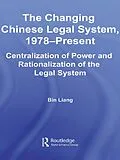This groundbreaking book examines the changing Chinese legal system since 1978. In addition to historical analyses of changes at the economic, political-legal, and social levels, Liang gives special attention to crime and punishment functions of the legal system, and the current judicial system based on field research, i.e., court observations in both Beijing and Chengdu. The court system has been in a process of systemization, both internally and externally, seeking more power and relative independence. However, traditional influences, such as preference of mediation (over litigation) and substantive justice (over procedural justice), and lack of respect (from the masses) and guaranteed power (from the political structure), still have major impacts on the building and operation of the judicial system. Liang also shrewdly places the Chinese legal and political reform within the global system. This book, which reshapes our understanding of the economic, political, and essentially legal changes in China within the global context, will be crucial reading for scholars of Asia, law, criminal justice, and sociology.
Inhalt
1. Introduction 2. Economic reform and reinterpreted Marxism 3. Legalization and centralization of power 4. Crime and punishment in transition 5. China's globalization 6. China's current court system: procedures, role players, and main issues 7. Conclusion
